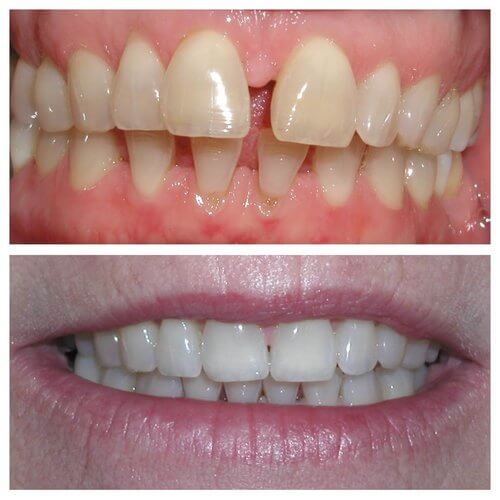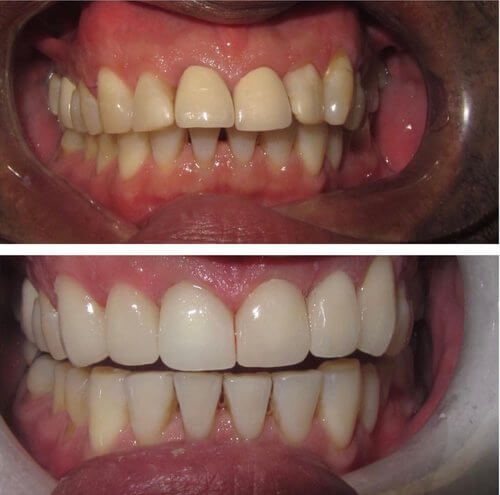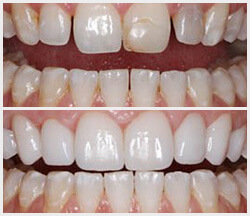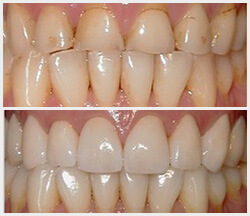Temporomandibular joint disorder (TMD) is a condition that affects the jaw joint and muscles. It can cause pain, discomfort, and limited movement in the jaw. TMJ disorder is a common problem that affects millions of people worldwide. While many associate TMJ disorder with jaw pain, it can also cause dental complications, such as teeth grinding and clenching.
Our Staten Island dentists want patients to be aware of the connection between TMJ disorder and dental problems.
Symptoms of Dental Issues Caused by TMD
Common dental issues that TMD can cause include:
- Teeth Grinding (Bruxism): TMD can cause involuntary teeth grinding or clenching, also known as bruxism. Bruxism can lead to worn-down teeth, cracked or chipped teeth, and even tooth loss in severe cases. Teeth grinding can also cause jaw pain and muscle fatigue.
- Tooth Sensitivity: TMD can cause tooth sensitivity characterized by pain or discomfort when eating or drinking hot or cold foods and beverages. Tooth sensitivity can also occur when biting down on food or when brushing and flossing.
- Uneven Bite: TMD can cause an uneven bite, meaning that the teeth don’t properly fit together. Uneven bites can cause dental issues such as teeth grinding, chipped or cracked teeth, and even jaw pain.
- Gum Recession: TMD can cause gum recession, which is when the gums pull away from the teeth, exposing the roots. Gum recession can lead to tooth sensitivity, tooth decay, and even tooth loss.
If you’re experiencing any of these symptoms, seek treatment for TMD as soon as possible. Your Staten Island dentists will evaluate your teeth and gums to determine the cause of your symptoms and the best way to address these issues.
How Do I Know if My Teeth and Gum Pain is From TMD?
If you’re experiencing teeth and gum pain, it may be hard to determine if it’s caused by TMD or another dental issue. However, some symptoms can help you identify if TMD is the underlying cause of your pain.
Symptoms of TMD-related teeth and gum pain include:
- Jaw Pain: TMD often causes pain in the jaw joint, which can radiate to the surrounding teeth and gums. The pain may be dull or sharp and can worsen when you chew or talk.
- Headaches: TMD can cause headaches located in the temples, forehead, or back of the head. The headaches may be dull or throbbing and can worsen when you clench your teeth or chew.
- Clicking or Popping in the Jaw: TMD may cause clicking or popping sounds when you open and close your mouth. It’s often accompanied by a sensation of the jaw getting stuck or locked in place.
- Ear Pain: TMD can cause ear pain, which may be accompanied by ringing in the ears (tinnitus) or dizziness.
How to Diagnose TMJ Disorder and Dental Problems
Diagnosing TMJ disorder (TMD) and dental problems can be a complex process that requires a thorough examination by a dental professional. Here are the steps involved in diagnosing TMD and dental issues:
- Medical History: Your dentist will begin by looking at your medical history, including any previous dental procedures, injuries to the jaw, or underlying medical conditions that may contribute to TMD.
- Physical Exam: Your dentist will examine your jaw and surrounding muscles to look for any signs of inflammation, tenderness, or misalignment. They may also assess your bite and look for any signs of wear and tear on your teeth.
- Imaging Tests: In some cases, your dentist may order imaging tests such as X-rays, CT scans, or MRI scans to get a more detailed look at the jaw joint and surrounding structures.
Bite Analysis: Your dentist may use advanced technology such as a T-scan or occlusal analysis to evaluate your bite and identify misalignment or abnormal pressure. - Joint Vibration Analysis: Joint vibration analysis (JVA) is a non-invasive test that measures the vibrations in the jaw joint. This test can help identify any issues with the jaw joint, including TMD.
Once your dentist has diagnosed TMD or dental problems, they’ll work with you to develop a treatment plan that addresses your needs.
Treatment Strategies for Managing Dental Issues Caused by TMD
Treatment options for managing dental issues caused by TMD include:
- Lifestyle Modifications: Making changes to your daily habits can help reduce the strain on your jaw joint and alleviate TMD symptoms. For example, practicing stress-reduction techniques, avoiding hard or chewy foods, and maintaining good posture can help alleviate TMD-related dental issues.
- Night guards: A custom-fitted night guard can help protect your teeth from grinding or clenching while you sleep. Night guards can also help alleviate jaw pain and reduce muscle tension.
- Bite Adjustments: In some cases, TMD-related dental issues may be caused by misalignment or an uneven bite. Our dentists in Staten Island may recommend making adjustments to your bite using dental restorations like crowns, bridges, or orthodontic treatment.
- Medications: Your dentist may prescribe medications to help alleviate TMD-related dental pain and inflammation.
- Physical Therapy: Physical therapy can help alleviate TMD-related dental issues by improving jaw function and reducing muscle tension.
- Surgery: In severe cases, surgery may be necessary to correct TMD-related dental issues. This may include procedures to reposition the jaw joint or realign the teeth.
Frequently Asked Questions
Should I see a dentist if I think I have TMJ disorder?
Yes, if you suspect that you have TMJ disorder, it’s recommended that you see a dentist. A dentist can evaluate your symptoms to provide a diagnosis and recommend treatment options. It’s crucial to seek professional help to properly manage and treat the condition and prevent further complications.
Can TMJ disorder cause permanent tooth damage?
It depends on the severity of your case. While TMD is unlikely to cause permanent tooth damage, chronic clenching or grinding of the teeth can cause wear and tear that may require dental treatment in the future. Visit a dentist to discover how to prevent lasting tooth damage from TMJ disorder symptoms.
Can orthodontic treatment help with TMJ disorder?
Orthodontic treatment may be helpful in some cases of TMD, such as if the symptoms are related to bite misalignment. However, orthodontic treatment isn’t always effective and may not be appropriate for everyone.
Is treatment for TMJ disorder covered by dental insurance?
Coverage for TMD treatment varies depending on the individual insurance plan. Some plans may cover diagnostic tests and treatments, while others may not cover TMD at all. Check with your insurance provider to understand what treatments may be covered.
Find Relief from Dental Issues Caused by TMD
TMD can cause various dental issues, including tooth pain, sensitivity, and tooth loss. Therefore, it’s crucial to seek professional help if you suspect that you have TMD.
If you’re experiencing any symptoms related to TMD, schedule an appointment with our dentists in Staten Island for an evaluation. We can provide a proper diagnosis and recommend appropriate treatment options to alleviate your symptoms and improve your oral health.



Insurance
We accept many insurances. Please contact one of our Insurance Coordinators to discuss your dental coverage plan.
(718) 948 5111
appointments@sidental.com
Open 7 days a week
Reviews
The dentists are absolutely excellent…
“I have been going here for years. The dentists are absolutely excellent and they always have an appointment available that fits into a busy schedule. I also completed invisilgn and my teeth are perfectly straight now. They also practice preventive medicine and just went in for my 6 month cleaning. Every time feel like I have a new set of choppers and best yet the check up noted no cavities!.”
— J.R
Pleasant visit
“As usual, it was a pleasant visit thanks to Dr. Nasso and her great staff..”
— C.M.
Always treated with courtesy and respect.
“Always treated with courtesy and respect. All of my questions were answered regarding upcoming treatments..”
— J.C.
Smile Profile




Put your best face forward.
Create a positive change to your teeth and your smile.
